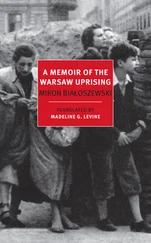While Izzy stooped down to collect leaves painted red and yellow by autumn, he kept me talking so that I wouldn’t seize up with despair. I’ve always lost my voice at the worst of times, however, so after only a block, I had to simply wave him off. Still, my feet kept going – a minor triumph – and after a time, as if through the rhythm of walking itself, an ethereal calm spread through me. As we passed the bomb-destroyed tower of the Royal Castle, though, a group of youths looking for a fight began calling us names. To foil their effort to provoke us, Izzy began singing a popular French song in his wobbly baritone; he and I have protected ourselves with the sound of our own voices since we were schoolboys teased by Christian classmates.
Jews from where we come from learn defensive strategies early, of course.
Along Freta Street, we joined a queue of refugees in our own city. Who knew so many of us had samovars, wicker furniture and bad landscape paintings? Or that a young mother with her small daughter clinging to the fringe of her dress would think of carrying a toilet into exile?
I looked at the faces around me, grimy with dust and sweat, and etched with panic. Sensing that the direction of my thoughts was straight down, Izzy hooked his arm in mine and pulled me forward. On reaching the door to Stefa’s apartment house, he took me aside and said, ‘Heaven, Erik, is where the most soft-spoken people win all the arguments.’
Izzy and I often try to surprise each other with one-line poems – gedichtele , we say in Yiddish, a language in which motherly affection embraces the tiny and insignificant.
‘But what becomes of the quiet people in hell?’ I asked, meaning here and now.
‘Who can say?’ he replied, but as we climbed the stairs, each of us lugging a suitcase, he stopped me. Laughing in a joyful burst, he announced, ‘Erik, there are no quiet people in hell!’
Stefa intended for Adam to share her bed so that I could have my privacy in her sitting room, but the boy stamped around the kitchen on my arrival and shouted that he was too old to sleep with her. Izzy – the traitor – handed Adam his colourful autumn leaves as a present and fled for home. I sat by my bloated suitcases as though beside two cadavers, soaked with sweat and humiliation.
My niece marched over to me as I fought for calming breaths. Knowing what she was about to demand of me, I threw up my hand to draw a last line she dare not cross. ‘It’s out of the question!’ I bellowed.
Believing that my bluster might trump her son’s desperation was the error of a man who had given over the raising of his daughter to his wife. Soon, I’d put Adam and Stefa in tears, and the Tarnowskis had come over to see what all the shouting was about. It was a Rossini opera performed in a grotesque mishmash of Yiddish and Polish. And I was the outmatched villain with his head in his trembling hands.
Sooner or later, you’ll make Uncle Erik feel better about everything if you behave like an angel , I heard Stefa whisper to Adam that night while tucking him in, but making the boy responsible for easing me into a life I never wanted only made me embrace my anger more tightly. The irony was that Adam and I had been friends before my move. On weekends, we’d launch paper sailboats at the lake in Łazienki Park, and he’d gabble on about what it was like to be growing up in an era of Hollywood stars, neon lights and automobiles. Smaller than most boys his age, he’d found success as a darter, the incarnation of a little silver fish. I’d given him his nickname, Piskorz .
Yet over those first wretched weeks as roommates, even Adam’s soft breathing kept me up. I’d sit under a blanket by the window, smoking my pipe and gazing up at the stars, an ache of dislocation in my belly. For how long would I be a refugee in my own city? Strangely it seemed, my thoughts often turned to how Papa would carry a folding chair and a novel to Saski Square when I’d fly my kite. Always that same kindly image of him watching over me would steal into my mind – like a silent film stuck on a single frame. One morning at dawn it occurred to me why: his fatherly caring and gentlemanly manners were representative of a way of life that the Nazis were murdering.
Though that turned out to be only one of the reasons why Papa had come to me…
*
One night during my second week in the ghetto, Adam burst up out of a nightmare and began sniffling into his pillow. At length, he crept to me wearing just his pyjama top, shivering, his arms out for balance – an elfin dancer teetering in the moonlight.
He must have kicked off his pyjama bottoms during the night because he had never let me or his mother see him naked of late; his best friend Wolfi had stupidly told him that his knees were knobbly and that the birthmarks on his ankle were funny looking.
When I asked the boy what was wrong, he gazed down and whispered that I didn’t like him any more.
What courage it must have taken for him to step within range of the Big Bad Wolf!
I longed to throw my arms around him and press my lips to his silken hair, but I restrained myself. It was a moment of sinister triumph over what I knew was right.
Undone by my silence, he began to weep. ‘You hate me, Uncle Erik,’ he blurted out.
At the time I was pleased to see his tears and hear the misery in his voice. You see, Heniek, someone had to be punished for our imprisonment, and I was powerless to act against the real villains in our opera.
‘Go back to sleep,’ I told him gruffly.
How easy it is to lose a hold of love! A lesson that I’ve learned and forgotten half a dozen times over the course of my life. Still, if you believe I wanted to hurt only Adam, you’d be wrong. And I got my wish, since the chilling shame of that night still clings to me.
Stefa would walk her son to his clandestine school on Karmelicka Street every morning at 8.30, on the way to the factory where she sewed German army uniforms ten hours a day. I’d accompany him home in the early afternoon, since my work at the Yiddish Lending Library ended at one, but he refused to put his hand in mine and would dash ahead of me. At home, he’d slump lifeless into his chair at the kitchen table – the posture of an unhappy combatant in an undeclared war.
I’d make him lunch, which was usually cheese on bread and onion or turnip soup – recipes from my days as a student in Vienna. We still had pepper then. Adam would grind away like a demon, flecking the soup’s steaming surface black, then lift the bowl to his mouth with both hands and savour its fire. In fact, he transformed into a fiend around anything spicy, and I once even caught him eating spoonfuls of horseradish straight from the jar, though Stefa would have spanked him if she’d found out.
In the afternoons, he’d play with his neighbourhood gang. His mother had made him swear to stay on our street, since Nazi guards had already shot several children suspected of being black-market couriers, but we now lived on an island of urban caverns and mazes awaiting his exploration, and she had little hope of him sticking to his promise. In truth, he and his friends wandered all over the ghetto.
On stormy afternoons, when he was forbidden to leave the apartment, Adam would sit cross-legged on our bed drawing pictures of animals or practicing his loopy penmanship. Owing to the influence of his Uncle Izzy and his musical mother, he’d often sing to himself, as well. Stefa had begun giving Adam music lessons when he was four or five and had first picked out melodies on her yellowing Bluthner keyboard, which meant that he now had a song catalogue in his head that extended from Zionist anthems like the ‘Hatikvah’ all the way across the Atlantic to Irving Berlin, though his pronunciation of English was nearly unrecognizable and often unintentionally comic.
Читать дальше












